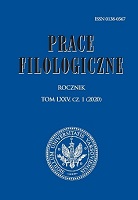Derived lexical reciprocal verbs in Czech
Derived lexical reciprocal verbs in Czech
Author(s): Václava KettnerováSubject(s): Lexis, Semantics, Western Slavic Languages, Philology
Published by: Wydział Polonistyki Uniwersytetu Warszawskiego
Keywords: reciprocity; valency; derivation; clitic reflexives;
Summary/Abstract: In Czech (as in other Slavic languages), clitic reflexives serve - among others - as a derivational means of deriving lexical reciprocal verbs, i.e., the verbs that encode mutuality directly in their lexical meaning. Here I draw a line between those lexical reciprocal verbs with which the reflexives introduce mutuality (nenávidět se ‘to hate each other’ ←nenávidět ‘to hate sb’ and slíbit si ‘to promise sth to each other’ ←slíbit ‘to promise sth to sb’) and those with which the reflexives have another function (oddělit se ‘to separate from each other’ ←oddělit ‘to separate sb/sth from sb/sth’). It will be shown that lexical reciprocal verbs of the former type form without exception the so-called discontinuous constructions with the nominative subject and the commitative indirect object (Petr si slíbil s Marií věrnost. ‘Peter and Mary promised fidelity to each other.’), and that they fall into several semantic classes, which, however, semantically overlap to a great extent with lexical reciprocal verbs of other types.
Journal: Prace Filologiczne
- Issue Year: 75/2020
- Issue No: 1
- Page Range: 215-240
- Page Count: 26
- Language: English

